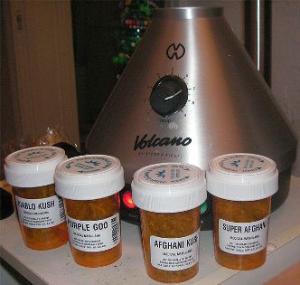Federal prosecutors threw a stink bomb in the room just as the Washington legislature was finalizing a medical marijuana dispensary bill. Now, the bill's future is in doubt.
Canadian marijuana activist Marc Emery will not be allowed to do his time in Canada because of "the seriousness of the offense" and "law enforcement concerns."
Vermont is another step closer to medical marijuana dispensaries after the state Senate approved a bill Friday. But there were trade-offs.
Florida legislators want to make poor people take a drug test -- and pay for it -- before they can get public benefits.
A new study of Vancouver drug overdoses shows they have decreased dramatically in the Downtown Eastside since a safe injection site opened there.
Cops stealing drug money, jail guards smuggling dope, deputies helping traffickers... and narcs gone wild in Peoria. Just another week in the drug war.
Skinning people alive!? Just when you thought it couldn't get any more gruesome.
A 24-year-old Toledo, Ohio, man is dead after firing on police who came to arrest him on drug charges.
Events and quotes of note from this week's drug policy events of years past.
The annual Drug Policy Alliance is accepting Letters of Inquiry -- due by April 29 -- for its 2011/2012 Promoting Policy Change grants program.
A bill that would create a system of state-regulated medical marijuana dispensaries and patient registries faces an uncertain future after Gov. Chris Gregoire (D) said she would not sign legislation that could get state employees in trouble with the feds.

The battle is joined over dispensaries in Washington, and the clock is ticking. (Image via Wikimedia.org
The bombshell statement came after she solicited the input of the state's two US Attorneys, Mike Orsmby in the Western District in Spokane and Jenny Durkan in the Eastern District in Seattle. The prosecutorial pair responded to Gregoire's inquiry with an April 14 letter warning of a possible federal response if the legislation passes.
"Growing, distributing and possessing marijuana in any capacity, other than as part of a federally authorized research program, is a violation of federal law regardless of state laws permitting such activities," Ormsby and Durkan wrote. "State employees who conducted activities mandated by the Washington legislative proposals would not be immune from liability under the Controlled Substance Act."
"I will not sign anything subjecting state employees to prosecution," Gregoire said last week after receiving the letter.
The bill,
Senate Bill 5073, has passed both houses, but needs to go before a conference committee to hammer out differences. Gregoire has urged legislators to send her a bill she can sign. They have until the end of the week to do so before the legislative session ends.
Some dispensary supporters are urging legislators to stand up to Gov. Gregoire, but others said the bill, as amended in the House, removed protections for patients and must be fixed in concurrence before going to the governor. The main House amendment removed protection from arrest from patients unless they signed onto the state's patient registry. And some are so unhappy with the bill, they would rather see it die.
The
ACLU of Washington, which supports the bill, sent a
letter to legislators over the weekend urging them to stand firm and saying the concerns expressed by Gregoire were overblown. The federal government has never prosecuted a state employee implementing a dispensary program, the letter pointed out, citing the example of New Mexico, where the state Department of Health administers the program.
The US Attorneys' letter displays the federal government's insistence on being part of the problem instead of part of the solution, said the letter, written by ACLU attorney Shankar Narayan. "The feds have promised no action to control the chaos of semi-legal businesses, yet balk at a law that regulates them sensibly," Narayan wrote. "The legislature and our governor must step in where the feds will not, so that patients can have access to medicine and communities are safe."
On Tuesday, the Seattle mayor, city council, and city attorney all signed a
letter to the Senate calling the federal threats to state employees "specious" and urging that body to accept the House amendments and send a strong bill to Gov. Gregoire.
"The question we face is not whether or not we are going to have medical marijuana use in Washington State," the Seattle officials wrote. "The voters already decided that question more than a decade ago. The question we face is whether or not we will have a thoughtful and rational regulatory framework for the production, processing, and distribution of medical marijuana. In its current form SB 5073 provides much needed clarity to this important issue and we urge you to adopt it and send it to the governor."
Also on Tuesday, several dozen
demonstrators showed up at the state capitol in Olympia calling on the governor to sign the dispensary bill. The protestors said Gregoire was abandoning patients and snubbing the will of the voters.
"We're in the early stages of making some noises to try to get the governor to change her position," said Philip Dawdy, a spokesman for the newly formed
Washington Cannabis Association, which came together to support the bill.
Another activist group, the
Cannabis Defense Coalition, however, is harshly critical of the bill as amended by the House, saying the House action had "torpedoed" the bill. The bill as amended by the House includes language "that removes arrest and search protection for authorized patients who choose not to notify the state of their medical treatment decisions and disqualifies parolees and people on probation from any medicinal use of cannabis," the group complained.
And pot provocateur and
CannaCare dispensary operator Steve Sarich was even more harsh, telling the
Seattle Weekly that the bill as amended by the House "eviscerated" patients' rights. Sarich led a small group of demonstrators to the ACLU of Washington offices last week to protest its support of the bill.
But now, it's up to the legislative conferees and the governor. Will the unpopular House amendment stand? Will the legislature stand up to the governor? Will the governor stand up to the feds? We will have the answers in a matter of days.
back to top
Canadian marijuana legalization activist Marc Emery, currently serving a five-year federal prison sentence in the US, has been denied in his request to finish serving his time in a Canadian prison. His Canadian attorney, Kirk Tousaw, said Friday that Emery received notice that US authorities had denied the request on the grounds of "the seriousness of the offense" and "law enforcement concerns."

Marc Emery leading a rally in Calgary during happier times (image via wikimedia.org)
Emery, the self-proclaimed "Prince of Pot," is serving time for selling marijuana seeds. Emery used the profits from those seed sales to fund legalization campaigns in Canada, the US, and elsewhere. His supporters have long charged that his prosecution was politically motivated.
Emery is currently at the federal holding facility in El Reno, Oklahoma, while awaiting transfer to a medium-security prison in Mississippi. He had previously been held in a minimum-security prison in Georgia. It is unclear why he is being transferred to a higher security prison.
Under a
bilateral treaty, Canadian prisoners serving time in the US can apply to serve their sentence in their home country, and vice versa. The guidelines for evaluating prisoner transfer applications are available
here.
"This refusal is a terrible affront to the sovereignty of Canada," said Tousaw. "Marc is a target of political persecution that appears to have transcended his conviction and now infects the treaty transfer process. He qualifies under every relevant factor and should have been allowed to serve out his jail term in Canada, close to his wife Jodie and in the country in which all of his activity took place. We call upon Prime Minister Harper and the leaders of the Liberal Party and NDP to stand up for this Canadian hero and demand his immediate repatriation."
Emery's wife, Jodie Emery, said she was "shocked and sickened" by the denial. "He has been punished for speaking out for the rights of tens of millions of cannabis consumers here and in the US and it's truly frightening," she said in a statement. "Canadians who feel Marc has been treated unfairly with an unjust five-year US prison sentence for seeds should punish the Conservatives in the federal election on May 2nd for extraditing Marc in the first place."
Tousaw said the notification of the denial came through unusual channels. Neither he nor Emery's US attorney were notified of the decision, as would usually be the case. Instead, someone in the US government notified the Canadian government, and Emery was notified via a letter from the Canadian consulate.
"This is very unusual and should not have happened," Tousaw said. "It makes me wonder whether the US and Canada are engaged in ongoing dialogue about Marc and lends support to the belief that politics are still influencing the process."
Emery can reapply for a transfer to his homeland in two years. If that doesn't occur, he will remain imprisoned in the US until he does 85% of his sentence.
back to top
A bill that would create a system of state-regulated medical marijuana dispensaries passed the Vermont Senate Friday on a 25-4 vote, but not before being amended to limit patients' ability to grow their own. The bill, Senate 17, is backed by Gov. Peter Shumlin (D) and now heads for the House.

Vermont could be the next medical marijuana dispensary state. (Image via Wikimedia.org)
In order to assure passage, bill sponsors accepted amendments limiting patients to registering with only one dispensary and barring patients registered with a dispensary from growing their own or obtaining medical marijuana from anyone other than the dispensary. Dispensaries would be regulated by the Department of Public Safety.
"We will protect patients by providing a legal source," Sen. Jeanette White (D-Windham) told her colleagues during debate.
Sen. Philip Baruth (D-Chittenden) recalled how his mother had asked him as a college student to procure marijuana for an aunt dying of cancer. He did so, but it meant he risked arrest and other negative consequences, he said. Vermont's current law puts patients in a similar bind, he said.
"For us to say we have sanctioned medical marijuana but will not provide legal access to that drug strikes me as not only potentially painful for families that are involved in these things, but also surreal," Baruth said.
Not everyone supported the bill. "I'm still amazed something illegal under federal guidelines is being made legal," said Sen. Richard Mazzo (D-Grand Isle/Chittenden)," before voting against it.
"This dispensary bill, in addition to requiring our state's primary law enforcement agency to support misdemeanor illegal activity, on the federal level by having dispensaries of this type we now involve them in regulating and overseeing what essentially is a felony under federal law," said Sen. Randy Brock (R-Franklin).
But those sentiments were a distinct minority Friday. Now, with the clock ticking on the legislature session, the question is whether the bill can move through the House before the session ends.
back to top
Bills that would require new applicants for temporary welfare assistance to undergo suspicionless drug tests -- and pay for them themselves -- are advancing in the Florida legislature. On April 13, House Bill 353 passed the House Health and Human Services Committee. That same day, the Senate version of the bill, Senate Bill 556, won approval from Senate budget subcommittee. Both votes were party-line votes in the Republican dominated legislature.

Welfare recipients are the latest targets of Florida politicos. (Image via Wikimedia.org)
Under the legislation, applicants who fail a drug test would be barred from receiving cash assistance for one year. Failing a second drug test, would mean a three-year ban. Children of rejected applicants could receive benefits if they can find another adult who can pass the drug test to be a payee.
Republicans voting for the bills argued that since many taxpayers must endure drug testing on the job, it was only fair that welfare recipients be tested as well. They also argued drug testing would provide an incentive for drug abusers to seek treatment.
Democrats and their supporters retorted that suspicionless drug testing would likely be found unconstitutional. They also argued that it would be unfair to force people seeking assistance because they're poor to pay the estimated $35 cost of the drug test.
"We believe it is not quite reasonable to expect folks who are applying for temporary assistance to undergo drug testing that they must pay for," said Michael Sheedy of the Florida Catholic Conference, who testified against the bill.
"It may seem a little onerous telling folks they need to get drug tested," conceded Sen. Rene Garcia (R-Hialeah). "But at the end of the day, I want to help people who want to help themselves."
"We're heading into a court challenge with this," warned Sen. Eleanor Sobel (D-Hollywood).
The only state to pass a suspicionless welfare drug testing ban was Michigan, but that law was struck down by a federal appeals court in 2002. The court held that testing without particularized suspicion violates privacy rights and the Fourth Amendment's protection against unwarranted searches.
That hasn't stopped drug testing bills aimed at welfare recipients, unemployment seekers, or other convenient scapegoats from being a perennial favorite of pandering politicians. Although no state has passed a bill since the 2002 court decision, bills have been filed in at least 16 states this year.
The House bill now awaits a floor vote, while the Senate bill goes before the Budget Committee Friday, and then, if approved, on to a floor vote.
back to top
Drug overdose deaths in Vancouver's Downtown Eastside fell dramatically after a safe injection site opened there, according to a study published online Monday in the British medical journal The Lancet. Fatal drug overdoses declined 35% in the vicinity of the Insite safe injection site in the two years after it opened, compared to only a 9% decline in the rest of the city.

Vancouver's Insite safe injection site on East Hastings Street (Image courtesy Vancouver Coastal Health)
"No one has ever been able to demonstrate a substantial reduction in overdose deaths due to the presence of a safe injection site, but we have done so," said Thomas Kerr of the Urban Health Research Initiative at St. Paul’s Hospital in Vancouver and one of the authors of the study.
The study examined 290 drug overdose deaths between 2001 and 2005, 89 of which occurred within 500 meters of the Insite location. Insite opened in 2003. After Insite opened, the overdose death rate within 500 meters dropped from 253.8 per 100,000 to 165.1 per 100,000, a 35% decrease. In the two years prior to Insite opening, 56 neighborhood drug users suffered fatal overdoses; in the two years after, only 33 did.
Previous research had shown that Insite reduced behaviors that could lead to blood-borne infections like Hepatitis C and HIV and contributed to public order by getting IV drug use off the streets and into a clinical setting.
It is not that drug overdoses do not occur at Insite; in fact, there have been 2,000 of them at the facility, but no deaths. In addition to providing injection booths and clean syringes, Insite has nurses on staff who can and do revive users who have overdosed.
Despite previously demonstrated benefits of Insite and the strong support of provincial health authorities, Canada's Conservative government has sought repeatedly to shut it down. The Canadian Supreme Court next month will hear the government's appeal of British Columbia courts' rulings that denying injection drug users such a service violates their rights under the Charter of Rights and Freedoms and that the province has jurisdiction in the case because Insite is providing a health care service, a provincial function.
For the study's authors, the conclusion was obvious: "Safe injection facilities should be considered where injection drug use is prevalent, particularly in areas with high density of overdose."
back to top
Cops stealing drug money, jail guards smuggling dope, deputies helping traffickers... and narcs gone wild in Peoria. Just another week in the drug war. Let's get to it.

Prohibition's filthy lucre is too much for some to resist (Image via Wikimedia)
In Edmond, Oklahoma,
a former Edmond police officer was arrested earlier this month for allegedly stealing $8,000 in drug bust money from the department evidence room. Benjamin
Northcutt, 35, is charged with grand larceny. The cash was seized during a drug raid last August, and
Northcutt was in the room when they money was counted and packaged before being placed in an evidence locker. Police videos show that
Northcutt entered and exited the evidence room alone 14 times between then and the time the money was discovered missing the next morning. He has denied taking it and is out on $2,000 bail.
In Baton Rouge, Louisiana,
a Baton Rouge police officer was arrested April 12 for allegedly stealing about $15,000 in seized drug money. Officer Michael Thompson, 27, admitted that he was strung out on prescription pain pills and took the money to fund his addiction, Baton Rouge police said. Thompson was a five-year veteran of the department and was assigned to the Narcotics Division at the time of his arrest. He resigned from the force shortly after being arrested. He faces seven counts of felony theft and one count of malfeasance in office.
In Peoria, Illinois,
three Chicago-area undercover narcs were arrested April 13 after they started fighting with bouncers at a local strip club. The three are members of the Metropolitan Area Narcotics Squad who were attending a law enforcement conference when one of them was denied entry to the club because he had no ID. That angered the other officers, and bouncers invited them to leave, prompting one to respond, "Why don't you try and make me?" while another assaulted a bouncer. The club called Peoria police, who arrested them as the brawl spread into the club's parking lot. One narc got two counts of battery, one got one count of battery, and one got one count of battery and one count of criminal trespass. All the offenses are misdemeanors. The suspects remain unnamed because naming them could jeopardize the safety of "ongoing undercover operations," Peoria police said.
In Boston,
a Massachusetts corrections officer was arrested Monday for allegedly trying to smuggle heroin to sell to inmates at a medium-security prison in Norfolk. Guard Ronald McGinn Jr., 40, went down after plotting with and sending text messages to an undercover FBI agent about the amounts of drugs he would smuggle into the prison and what he would be paid for his efforts. He was carrying 28 grams of heroin when arrested. He is charged with possession of heroin with intent to distribute at a prison. He's looking at up to 20 years in prison.
In Houston,
a former Harris County deputy pleaded guilty April 14 to using his position to protect someone in a drug case in return for cash. George Ellington, 38, admitted accessing confidential information from a law enforcement database to protect a person he believed was transporting Ecstasy. He was to receive $500. Instead, he has now pleaded guilty to one count of extortion and is looking at a five-year prison sentence.
In Newark, New Jersey,
a former state corrections officer pleaded guilty Monday to charges he fronted a complex contraband-smuggling ring that included heroin, cocaine, marijuana, and cell phones. Luis Roman admitted making thousands of dollars in a scheme involving 35 other people. He pleaded guilty to racketeering and official misconduct charges for running smuggling rings at the Adult Diagnostic and Treatment Center in Avenel and then at Northern State Prison in Newark. He's looking at 14 years in prison. Sixteen prisoners and 18 others have also been indicted in the scheme, and five have so far pleaded guilty.
back to top
Mexican drug trafficking organizations make billions each year smuggling drugs into the United States, profiting enormously from the prohibitionist drug policies of the US government. Since Mexican president Felipe Calderon took office in December 2006 and called the armed forces into the fight against the so-called cartels, prohibition-related violence has killed more than 36,000 people, including more than 15,000 last year. The increasing militarization of the drug war and the arrest or killing of dozens of high-profile drug traffickers have failed to stem the flow of drugs -- or the violence -- whatsoever. The Merida initiative, which provides $1.4 billion over three years for the US to assist the Mexican government with training, equipment and intelligence, has so far failed to make a difference. Here are a few of the latest developments in Mexico's drug war:

The busts and arrests go on, but so does the violence. (Image via Wikimedia)
In Sinaloa,
eleven people were found buried in a field near the town of Ahome. It is unclear when the dead -- nine males and two females -- were killed, or by whom.
Wednesday, April 13
In Ciudad Juarez,
the bodies of four men who were last seen being kidnapped by members of a special police unit were discovered in a ravine just outside the city. Three police officers from the elite "Grupo Delta" have been arrested for the March 26 kidnapping. The four victims are all between 23 and 28 years old.
In Monterrey, six people were killed during a fire fight between the Army and a group of gunmen. Five of the dead were armed suspects and one was an uninvolved female motorist who was killed in the crossfire. Additionally, an eight-year old girl was wounded in the legs when she was hit by stray bullets during the incident, which began when soldiers gave chase to two SUVs full of armed men.
Thursday, April 14
In Ciudad Juarez
, a state prosecutor was gunned down outside his home by heavily armed men. Marion Ramon Gonzalez was leaving his home at 8:20am when he was attacked by men carrying assault rifles who had arrived in three black vehicles.
In Ciudad Juarez
, three children were killed when unknown assailants threw a Molotov cocktail through the window of their home. The mother escaped the blaze with her hair and clothing on fire.
Friday, April 15
In Veracruz,
a police chief and two of his officers were killed after being ambushed by gunmen. Juan Moreno Lopez was the head of the inter-municipal police force for the Minatitlan-Cosoleacaque area. The other two officers were his bodyguards. These deaths bring to nine the number of police officers killed in the Veracruz area in under a month.
Saturday, April 16
In Ciudad Victoria, Tamaulipas,
Mexican marines captured a high-ranking Zeta who has been linked to the mass graves in the San Fernando area. Martin "Comandante Kilo" Estrada Luna was arrested along with five others during a raid. He has also been linked to the August 2010 murder of 72 migrants and is thought to be the Zeta commander responsible involved in drugs, extortion, and human trafficking activities in the area.
In Tepic, Nayarit
, a man was found skinned and posed on a bridge in the city. This is the third case of someone being skinned in the last several weeks in Tepic. The victim -- who remains unidentified -- had had his hand cut off and left placed on his chest.
Sunday, April 17
In Acapulco,
six men were discovered murdered in the popular resort area of Costa Azul. Two of the dead were discovered in a vehicle, and another two were discovered in a nearby alley. Two more were found not far away. A note left with the body indicated that the men had been killed by the Sinaloa Cartel.
In the nearby city of Chilancingo, a man was gunned down outside his home.
In Nuevo Laredo, Tamaulipas,
the top security official for the state resigned. Former General Ubaldo Ayala Tinoco had previously threatened to resign if the state government did not begin providing police with better salaries. Recently, 16 police officers were arrested for allegedly being involved with the mass graves that are still being fully uncovered in San Fernando, Tamaulipas.
In Ciudad Juarez, 14 people were murdered in various incidents across the city. In one incident, a man was found dead after having been beaten to death with a stone. In another incident, a man -- showing signs of having been tortured -- was discovered in a pile of trash.
Tuesday, April 19
In Veracruz, ten gunmen were killed during a series of clashes with soldiers. The fighting began when soldiers on patrol in the Infonavit Rio Medio neighborhood came under fire. A second gun fight occurred after they chased suspects who had fled. One civilian was wounded in the arm by a stray bullet.
[Editor's Note: We have relied in the past on El Universal's weekly body count, but it has not been appearing recently. We thus suspect that our totals are undercounting the actual totals.]
Total Body Count for the Week: 218 (including the 145 so far exhumed in San Fernando)
Total Body Count for the Year: 2,209
Total Body Count for 2010: 15,273
Total Body Count for 2009: (approx.) 9,600
Total Body Count for 2008 (approx.): 5,400
Total Body Count for 2007 (approx): 4,300
Total Body Count for Calderon's drug war through 2010: 34,849
Total Body Count for Calderon's drug war to date: 37,058
back to top

Samuel Birch reportedly did not want to go back to jail.
A man police were attempting to arrest on drug charges shot and wounded a Toledo, Ohio, police officer before being shot and killed himself early Saturday morning. The dead man was identified as Samuel Birch, 24. He becomes
the 22nd person killed in US domestic drug law enforcement operations so far this year.
According to police accounts, four Toledo police officers arrived at Birch's home at 1:30am Saturday to serve a felony drug warrant. Two officers approached the front door, while two others went to the rear of the property. Birch answered the door, and after a brief exchange with officers, pulled out a 9 mm semi-automatic hand gun and fired off two rounds before his weapon jammed. One shot struck Officer Robert Orwig in the calf. His injuries are not life-threatening.
Orwig and another officer, Neil Piasecki, returned fire. Orwig fired three shots and Piasecki fired eight. Birch was struck by six bullets and was pronounced dead at the scene.
Toledo Police Chief Michael Navarre said that police had been told that Birch, who had been prosecuted on drug charges last year, had vowed not to return to jail. "He had made statements that were relayed to the officers prior to this incident occurring this morning that he was not going to go back to jail, that he was not going to be taken alive," Chief Navarre said.
In the house at the time of the shooting were Birch's girlfriend and two children aged five and 12. They were not injured.
back to top
April 25, 1894: The British Indian Hemp Drug Commission concludes that cannabis has no addictive properties, some medical uses, and a number of positive emotional and social benefits.
April 27, 1937: In a statement before the US House of Representative Ways and Means Committee, Clinton Hester testifies that a Washington Times editorial published shortly before Congress held its first hearing on the marijuana issue argued: "The fatal marihuana cigarette must be recognized as a deadly drug and American children must be protected against it."
April 23, 1998: The Ottawa Citizen reports that Canadians who tell US border officials the truth about their past use of marijuana will be denied entry to America indefinitely.
April 25, 2000: Despite the formal opposition of the Hawaiian Catholic Church, the Hawaii State Senate passes medical marijuana legislation, joining California, Oregon, Washington, Maine, Alaska, and Arizona in shielding medical marijuana patients from criminal prosecution.
April 24, 2001: In Oklahoma, Will Foster, 42, a medical marijuana patient who in 1995 was sentenced to 93 years in prison for growing 39 marijuana plants in his basement, is released on parole. Foster used marijuana to relieve chronic pain caused by acute rheumatoid arthritis. "My medical use of marijuana never interfered with my work, I ran a successful business," said Foster. He added, "I was minding my own business taking care of my health and my family. What was I doing to anybody that got me 93 years?"
April 21, 2004: US Circuit Court Judge Jeremy Fogel bars the US Dept. of Justice from interfering with Mike and Valerie Corral, heads of a medical marijuana hospice near Santa Cruz, California, with their 250 patients, or with their marijuana garden. Judge Fogel cites Raich v. Ashcroft, a 2004 Ninth Circuit decision which found the federal government has no jurisdiction over patients who grow their own plants.
April 22, 2004: The Pacific edition of the magazine Stars and Stripes reports that twenty sailors assigned to Commander, Naval Forces Marianas (Guam) were arrested on drug-related charges since late 2003 alone.
back to top
The Drug Policy Alliance will have approximately $750,000 to allocate during the 2011/2012 Promoting Policy Change grant cycle. Promoting Policy Change is a fund that has a two tier application process. We require an LOI to initiate the relationship, and thereafter, a proposal from those invited to apply. The deadline for the LOI is is Friday, April 29 at midnight EST.

candlelight vigil, 2009 DPA conference, Albuquerque
The LOI should include a single page that includes your organizational name and all contact information; if you are a 501(c)(3); what the mission of your organization is; and what the specific goals and deliverables you propose are. If you are invited to apply, you will be notified on or about May 15th, and the deadline for proposals requested is June 20, 2011 at 8:00pm EST. Through the annual Promoting Policy Change grant cycle -- which does not accept unsolicited proposals -- we seek to broaden public support for drug policy reform and will fund invited organizations who have continually demonstrated strategic and innovative approaches to increase such support.
We invite proposals designed to:
- Educate the public and policymakers about the negative consequences of current local, state or national drug policies.
- Promote better awareness and understanding of alternatives to current drug policies.
- Broaden awareness and understanding of the extent to which punitive prohibitionist policies are responsible for most drug-related problems around the country.
The program provides both general operating support and project specific grants. All grantmaking is directed at organizations working within the United States, with particular emphasis on state-based activity. Strategic, geographic or thematic collaborations are strongly encouraged. Generally, the cap on grants awarded during the Promoting Policy Change cycle is $50,000, although most grants average between $15,000 and $25,000.
The Program will make grants to organizations that have been invited to apply and who demonstrate a clear ability and commitment to educate the public about the need for broad drug policy reform. Priorities for this grants program include organizations focused on one or more of the following:
- Public education campaigns and litigation to raise awareness of the negative consequences of current local, state and national drug policies.
- Organizing and constituency mobilization efforts which raise awareness about the negative consequences of local, state or national drug policies.
We define important public education efforts as those that speak to:
- the failures and consequences of drug polices in the United States and the possible benefits of policy alternatives to criminal prohibition;
- the reduction of the reliance on the criminal justice system by raising awareness of the need for alternatives to incarceration and/or a more health-based approach to drug use;
- discrimination in employment, housing, student loans and other benefits against those who use drugs or who have been convicted of drug offenses;
- the negative consequences of current drug policies on human rights; and
- efforts that mobilize people to organize and demonstrate around the disproportionate impact on communities of color and youth.
Decisions are made in mid to late September. No early decisions are ever made. LOIs should be mailed to both asha bandele and Teresa Bonomo at [email protected], and [email protected]. Visit http://www.drugpolicy.org/about-us/advocacy-grants-program for further information.
back to top









